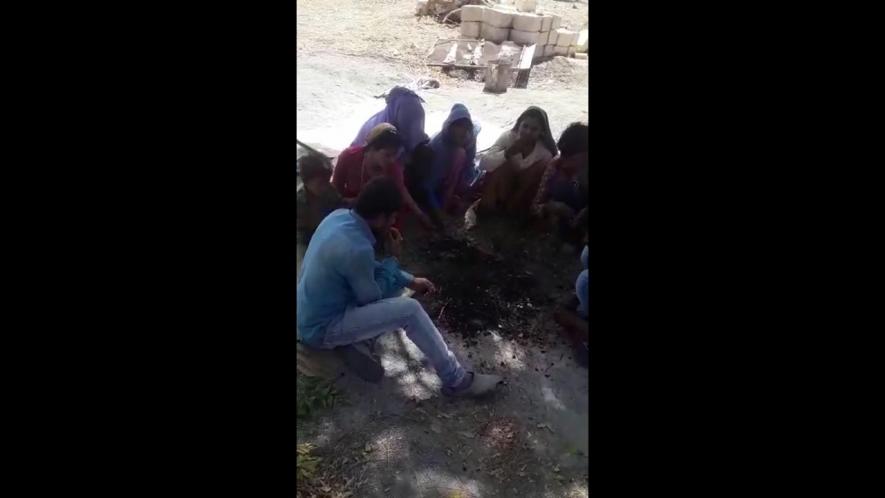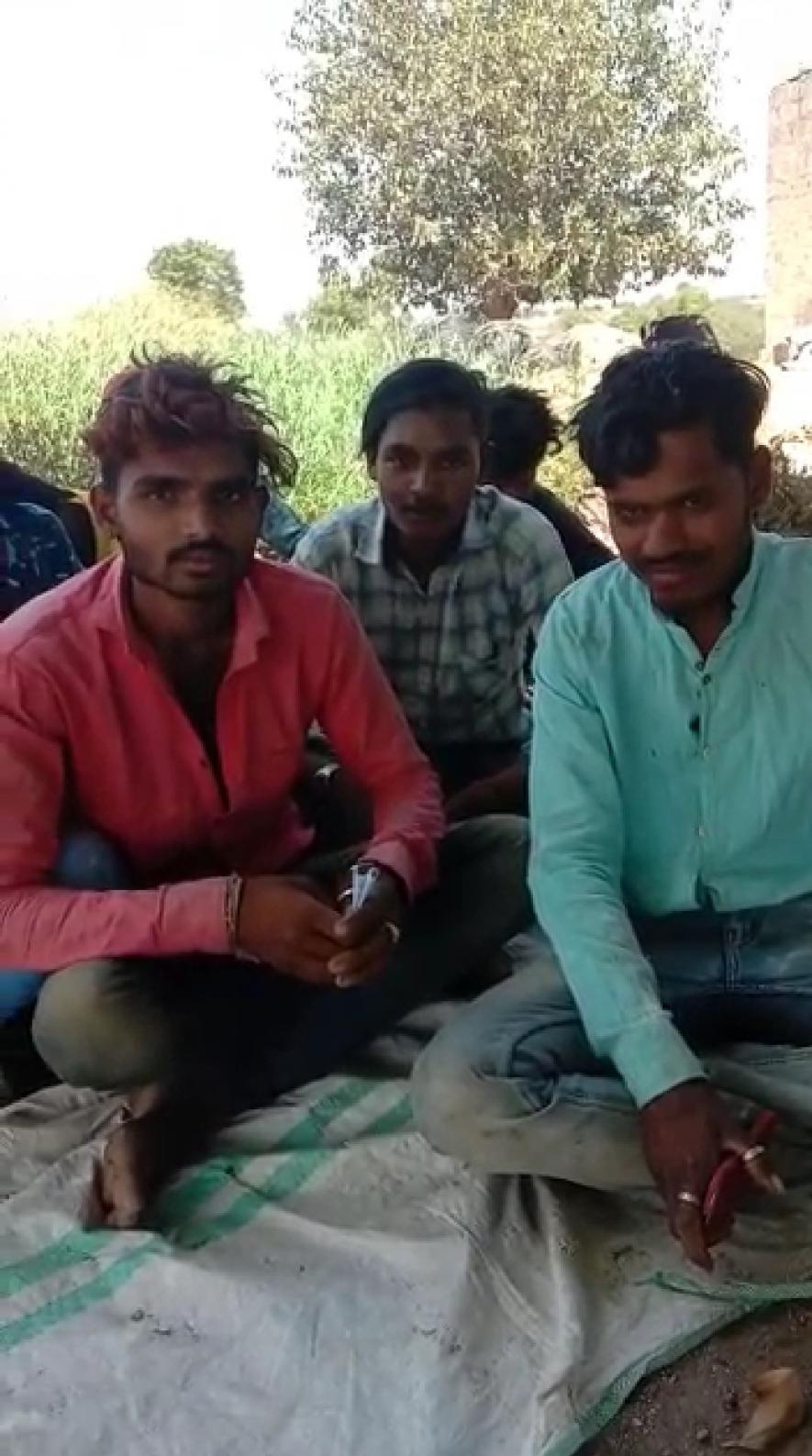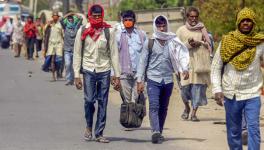COVID Lockdown: We’ve Run Out of Food, Say Migrant Workers Stranded in Gujarat

Workers, stuck at Dhoraji in Rajkot, burnt and ate chana for some days before running out of food completely. | Image Credit: Damayantee Dhar
Amid the 21-day countrywide lockdown and the COVID-19 pandemic, the whole country is witnessing an unprecedented exodus of migrant labourers on foot to reach their homes. In Gujarat’s Surat district, the situation turned violent on March 21, when about 500 textile workers who were trying to go back to their homes were stopped by the police. Following this, 96 workers were arrested who were released on bail on March 30.
The migrant workers, mostly from Uttar Pradesh, Bihar, Madhya Pradesh, Odisha and Chattisgarh, work in dyeing and printing mills and power loom units in Surat. The Federation of Surat Textile Traders Association (FOSTTA) had declared closure of the dyeing and printing mills, power-looms and the cloth market from March 21 viewing the pandemic and government orders. However, many dyeing and printing mills had already curtailed on the number of working days and strength of workforce, as the industry has been in recession and is yet to recover from effects of GST and demonetisation.
As a result, the earning of most workers have gone down considerably. Moreover, many mill and power loom owners did not pay their workers before shutting down on March 21.
“Amid uncertainty, the dyeing and printing unit where I work had remained closed for two days in the last week. I earn around Rs 350 a day, which we get paid weekly or fortnightly. When the lockdown was announced, the factory owner told us not to come to work without clearing our pending due salary. Most of our contractors had left for their home early this week so we couldn’t reach the factory owner to demand our dues,” Shailendra Kumar, who is a native resident of Nawada district, Bihar, told NewsClick.
Also read: Gujarat: Farmers, Industries Hit Due to COVID-19 Lockdown
“We have no food or drinking water. My house owner warned on Friday to pay this month’s rent or leave. I have been eating rice and salt for past couple of days. Finally, I decided to move for my home with a bottle of water that I had left and my mobile,” said another textile meal worker.
On the night of March 21, they left Pandesera, an area in Surat that is home to large numbers of migrant workers in the textile industry, and walked towards the National Highway. Surat Police stopped them near Sachin, about 2 kms from Pandesera. Some of the workers reportedly began pelting stones when police resorted to lathi charge, lobbed tear gas and opened fire in the air to disperse the crowd.
“We have registered a complaint of rioting against a mob of migrant workers. They have also been charged under sections related to attacking police, damaging public property and under provisions of Epidemic Diseases Act for defying restrictions,” Vidhi Chaudhary, Deputy Police Commissioner of Police of Zone 3, Surat, told the media.
Workers Asked to Vacate
The textile mill workers live in urban ghettos in and around Pandesera and Kadodara areas of Surat. In densely populated residential buildings in these areas, dingy, damp rooms are rented out to workers at around Rs 2,000 – Rs 3,000 a month. A worker who shares a room of 10x10 feet with at least 4 others, gets to cook in one corner of the room, eat, sleep and access a common toilet for 12 hours in lieu of the rent he pays.
“One worker cannot afford the whole rent so we share. Besides, we work for 12 hours shifts at a stretch so the owner rents out to another set of workers while we are away. But now that mill units are shut down, the room is being shared by 8 to ten people. We feel suffocated after staying even an hour in our rooms,” says Rakesh Yadav, a textile mill worker from Jamui Bihar.
On March 27, the Gujarat government decided to put a ban on travelling of migrant workers while assuring that food and shelter will be provided to them in respective districts.
Also read: COVID-19: Under Lockdown, Gujarat’s Daily-Wagers and Slum-Dwellers Have Run Out of Food
“District administration have been asked to make arrangements for the food and accommodation of migrant workers. It has been decided that they wont be allowed to travel anymore till the lockdown,” Ashwin Kumar, Secretary to the Chief Minister, told reporters on March 27.
However, workers who continue to defy lockdown and walk hundreds of kilometres on foot to reach their home town, claim not only have they run out of food and money but they are also being asked to vacate the rented space until they pay next month’s rent.
Apart from industrial workers, daily wage earners who work at construction sites and agrarian workers, mostly from Madhya Pradesh are stuck in Gujarat. Many of them who attempted to walk to their homes were sent back by police.
One such group of 11 women and 8 men and 5 children, all agrarian labourers from Jhabua, Madhya Pradesh, are stuck at a village in Dhoraji taluka in Rajkot. The group has been living in a shed on the agricultural field since the land owner decided to stop all work due to lockdown and COVID-19 pandemic.
“After we were told that everything will shut down, we decided to go home but by then all modes of communication were shut down. We tried walking but were sent back by the police. We have been living in the bari (a shed made of hay roof in the field usually meant to stock produce after harvesting ) where we work. For two days, we did not have any food till our employer came to the field and gave us some rice, wheat flour and vegetables,” Vikram, one of the workers stranded in Rajkot told NewsClick.

Vikram, one of the agricultural workers, who is stranded in Rajkot.
“No government machinery has reached us yet. We will manage with what have been given to us for now,” he added.
Another group of labourers from Jhabua who used to work at a construction site is stranded in Jamnagar district. “The employer has given us one room to stay but we have run out of food,” Rajesh, one of the labourers, told NewsClick.
Get the latest reports & analysis with people's perspective on Protests, movements & deep analytical videos, discussions of the current affairs in your Telegram app. Subscribe to NewsClick's Telegram channel & get Real-Time updates on stories, as they get published on our website.
























